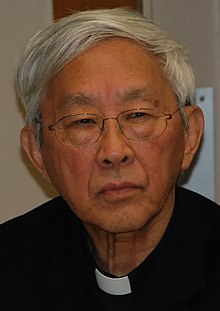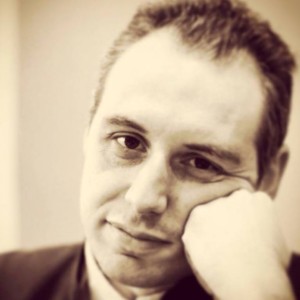
Cardinal Joseph Zen, 89, of Hong Kong, China. We spoke together today in a video-taped round-table discussion on the liturgy organized in Italy by Italian musicologist Maestro Aurelio Porfiri
“Even if the wounds of this shattered world enmesh you, and the sea in turmoil bears you along in but one surviving ship, it would still befit you to maintain your enthusiasm for studies unimpaired. Why should lasting values tremble if transient things fall?”—Prosper of Aquitaine (390-455 A.D.), a disciple of St. Augustine of Hippo and one of the secretaries of Pope Leo the Great (440-461 A.D.). Prosper was a layman, but threw himself with ardour into the religious controversies of the day, defending orthodoxy, particularly the doctrine of the necessity of grace against the Pelagians
Prosper of Aquitaine wrote the lines above in the early to mid-400s in what was then the collapsing province of Gaul in the Roman Empire, soon to be overrun by the barbarian Goths, Vandals and Franks. So Prosper writes in a time when the vineyards begin to be unkept, the orchards unpruned, the stone aqueducts cracked and unrepaired, and the whole edifice of the once-glorious empire of Rome — a bit like the free countries of the West in our own time — begins slowly to slide into its colossal decline and fall… Still, Prosper continued his studies, writing in defense of the truth, as best he could…
“The motu proprio Traditionis Custodes has caused many concerns in Catholic communities around the world: “The liturgical books promulgated by Saint Paul VI and Saint John Paul II, in conformity with the decrees of Vatican Council II, are the unique expression of the lex orandi of the Roman Rite.” Will there be a future for the traditional Latin Mass?” —Italian Maestro Aurelio Porfiri, in the introduction to a round-table on the liturgy convened this morning, now available on the internet
Letter #82, 2021, Monday, August 9: Zen
I was privileged today to participate with Cardinal Joseph Zen, 89, of Hong Kong, China, and Bishop Athanasius Schneider, 60, in a round-table discussion on the liturgy organized by Aurelio Porfiri, a very talented Italian musicologist (he has been the organist in St. Peter’s Basilica) with an expertise in sacred music.
(Maestro Porfiri and I are planning to begin regular coverage of sacred music, with articles by Porfiri himself, in the pages of Inside the Vatican magazine. To subscribe to our unique magazine, click here.)
Zen at five years old, attending Mass in Latin in China
Cardinal Joseph Zen, 89, of Hong Kong, China, participated and spoke with great eloquence about how his own faith was formed in a profound way by the celebration of the old Latin liturgy when he was a boy in Shanghai almost a century ago.
He said his father brought him to five Masses every Sunday, and that this shaped him profoundly, leaving an indelible impression on his mind and heart.
Zen said he felt saddened by the decision of Pope Francis on July 16 to suppress the old Latin liturgy in his decree Traditionis custodes.
Zen said that the natural love of the Chinese people for the thoughtful silence and ancient, austere ritual of the old Mass had drawn millions to faith in Christ over the centuries (see the video at about 17 minutes from the end).
Zen suggested that officials in the Vatican’s Secretariat of State had urged the Pope to take this decision, though he acknowledged that, though he is one of the senior cardinals in the Church, he does not really understand the true motivation for this decree.
When it comes time for him to die, Zen said, he has asked for a funeral Mass to be celebrated for him according to the old Latin rite. He said he hopes that will still be possible.
Zen also surprised all of us by chanting briefly (in Gregorian chant) a few lines from the Dies irae, an old Latin hymn (toward the end of the video, with about 16:30 left, link here and below).
Schneider and the sacrifice of the Mass
Bishop Athanasius Schneider, 60, of Astana, Kazakhstan, concentrated more on the meaning of the Mass itself, stressing that the sacrificial element was paramount — that the Mass at once is a commemoration of the sacrificial death of Christ on the cross, and a spiritual participation in that sacrifice, meaning that the Mass, being Christocentric, rather than “community-centric,” that is, focusing on Christ rather than on anything else, actually may be associated truly with the sacrifice of Christ on the cross.
This is why the Mass is celebrated on an altar, and the gifts of bread and wine are offered to God, Schneider said.
An altar, he emphasized, not a table, so that it drew on all the symbolism — and reality — of the Jewish Temple sacrifice, and of the sacrifice on the cross, as well as on the Passover meal symbolism which gave special meaning to Jesus’ Last Supper with His disciples in the Upper Room, which was indeed a meal, but yet was set within this larger, sacrificial context.
Bogle, Alanis Suarez, Rao…
Also guests on the program were James Bogle, former head of Una Voce International of Great Britain, Felipe Alanis Suarez, present head of Una Voce, of Mexico, and Prof. John Rao, a graduate of Oxford who now teaches at St. John’s University in New York, USA, one of leaders of the Roman Forum, founded by Dietrich von Hildebrand in 1968.
All spoke of how many tens of thousands of Catholics, often families with many small children, have drawn great spiritual nourishment from the austere beauty of the old liturgy, and of how they do not desire to break with Rome, or Pope Francis, or any of the Popes of the past, but to remain in union with Rome, and with all their ancestors in the faith and all the saints who down the ages chanted the hymns and prayed the prayers of the old liturgy with great devotion for 20 centuries.
So the round-table included representatives from China, Kazakhstan, Great Britain, Mexico, the United States, and Italy. A cross-section of the peoples of the world, one might say, and in this sense, a catholic round-table…
Here is a link to the video: link, and link.
[Note: The beginning is a loud advertisement, then there is silence for three minutes; the content begins at around the 3:05 minute mark]

Aurelio Porfiri (left): Italian Composer, Choral Conductor, Organist, Educator, Author and Publisher.
Fellow of Trinity College London in Music Composition. Formerly Substitute Organist of the Vatican City Vicariate in Saint Peter’s Basilica, as well as many notable churches in Rome.
Taught and conducted sacred music in Macau and Shanghai, China.
Recognised in The Cambridge Companion to Choral Music as one of three 20th & 21st century Italian Church composers “whose choral music clearly exhibits the influence of national traditions.”
Published over 30 books and 600 articles, recorded over 10 CD albums, and has over 100 musical compositions in print from publishers in China, France, Germany, Italy and USA. Served as artistic director and jury member for choir competitions in China, Italy, Thailand and USA, and led choirs in Italy, Macau and Shanghai.
Founder and CEO of Choralife, publisher of music scores and CDs, and Chorabooks, publisher of books and ebooks. Creator of Altare Dei, a magazine dedicated to Liturgy, Sacred Music and Catholic Culture.
“I continue my researches in music composition, especially in the world of modal scales and the Roman tradition of Church music, of which I am heir and follower,” Pofiri says.
The Shenandoah Valley Experience Pilgrimage
October 24 – 29, 2021
From the rolling waters of the Shenandoah River to the rich, orange sunsets of Shenandoah National Park in the Blue Ridge Mountains; from the bountiful farmland of this river valley to the many National Shrines in the area; we will encounter the beating heart of the Church and America today. Come to renew your soul, rest your mind, and ignite your heart.
Click the button below to view the itinerary and to see available booking options. Space is limited so don’t miss out!








Facebook Comments